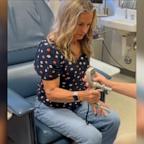New Contacts May Correct Vision
April 12 -- A new option will soon be available for people who want to do away with their eyeglasses or regular contact lenses but are hesitant to undergo corrective eye surgery.
Orthokeratology is a new procedure in which visually impaired patients wear specially designed contact lenses while they sleep. The lenses correct distance vision by molding the cornea into the proper shape. Once the contacts are removed, the improved eyesight lasts eight to 20 hours.
Doctors create the contacts by using a machine that measures as many as 15,000 points on the cornea so that each new lens can be customized with precision, and then worn overnight.
A Food and Drug Administration panel recently recommended approval of these new lenses and a final decision is expected later this year.
Convenient, But Costly
The procedure is designed for people who want to forgo traditional eye correction devices, but are concerned about LASIK surgery.
"I wanted something that was safe and if I didn't like it, it was reversible," says Marsha Adkins of Colorado, who says she was tired of her eyeglasses and found soft contacts uncomfortable.
Adkins has been wearing the corrective lenses as part of a study, and she's happy with them.
"I put them in before I go to bed at night. I take them out first thing in the morning when I get up, and that's it. They've corrected my vision," she says.
Lisa Pedersen of Massachusetts, who has been wearing them for four months, says the lenses are convenient and provide her with a newfound freedom from glasses.
"I don't have to constantly wipe off my glasses when I go out in the rain. When I wake up in the morning I can see the alarm clock. I can't wait to go swimming this summer because I'll finally be able to see the ocean floor."
The lenses cost about $800 a pair. Since the lenses can last for up to three years, Pedersen says she's actually saving money.
"I don't have to order special prescription sunglasses, I can wear any style now. And I don't have to keep buying a new pair each time my prescription changes," she says.




